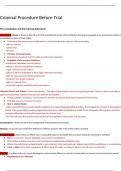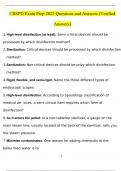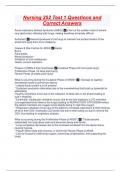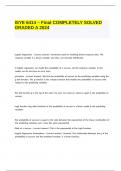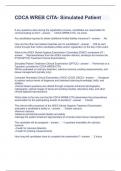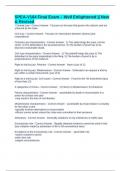The Constitution and the Criminal Defendant:
Due Process Clause- a clause in the 5th and 14th amendments to the US Constitution that protects people from government actions t
would deprive them of basic rights
● Procedural due process most implicated in criminal law because ensures a fair proceeding
-right to counsel
-speedy trial
-jury trial
● Doctrine of Incorporation
● Due process means at least the right to notice and a hearing
● Examples of due process violations:
-insufficient indictment (no fair notice)
-failure to disclose exculpatory evidence
-vague statutes (no fair notice)
-failure to inform defendant of their rights (Miranda warnings)
-right to cross-examine witnesses (hearsay)
-freedom from double jeopardy
-right to a speedy trial
-protections against unlawful search and seizure
Unlawful Search and Seizure- fourth amendment; "The right of the people to be secure in their persons, houses, papers, and effects,
against unreasonable searches and seizures, shall not be violated…"
● Protects people- not places- and focuses on whether the person took steps to preserve their privacy
● Probable cause is necessary to search
● Katz v. United States:
-police suspected Katz of using a public payphone to conduct illegal gambling activities; they bugged the outside of the payphon
booth; Katz argued that he had an expectation of privacy inside the telephone booth; Court of Appeals affirmed the conviction
because police had not actually entered into the private area
-SCOTUS reframed the question and said the privacy applied to the person, not the place
Incorporation- when two ideas are incorporated, they become one concept
Hearsay- an out-of-court statement offered in evidence to prove the truth of the matter asserted
Probable Cause- exists when an officer has a reasonable basis for the belief that a person should be searched or arrested
● Before a warrant is issued, probable cause must be established
● Warrantless searches may occur, but must also be supported by probable cause
● Where the police have an opportunity to get a warrant, they must seek one. Regular warrantless surveillance is unconstitution
● Terry v. Ohio- terry stops- pat downs; if officer feels his safety or safety of others is at risk, they can do frisks
Warrant- a written order of a court allowing law enforcement officers to search a certain place, or search or arrest a certain person
● Requirements of a Warrant:

